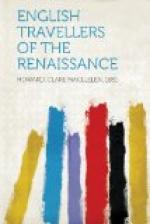At about the time (1575) when some of the most prominent courtiers—Edward Dyer, Gilbert Talbot, the Earl of Hertford, and more especially Sir Christopher Hatton and Sir Philip Sidney—had just returned from abroad, book-publishers thought it worth while to print books addressed to travellers. At least, there grew up a demand for advice to young men which became a feature of Elizabethan literature, printed and unprinted. It was the convention for a young man about to travel to apply to some experienced or elderly friend, and for that friend to disburden a torrent of maxims after the manner of Polonius. John Florio, who knew the humours of his day, represents this in a dialogue in Second Frutes.[38] So does Robert Greene in Greene’s Mourning Garment.[39] What were at first the personal warnings of a wise man to his young friend, such as Cecil’s letter to Rutland, grew into a generalized oration for the use of any traveller. Hence arose manuals of instruction—marvellous little books, full of incitements to travel as the duty of man, summaries of the leading characteristics of foreigners, directions for the care of sore feet—and a strange medley of matters.
Among the first essays of this sort are translations from Germanic writers, with whom, if Turler is right, the book of precepts for travel originated. For the Germans, with the English, were the most indefatigable travellers of all nations. Like the English, they suddenly woke up with a start to the idea that they were barbarians on the outskirts of civilization, and like Chicago of the present day, sent their young men “hustling for culture.” They took up assiduously not only the Renaissance ideal of travel as a highly educating experience, by which one was made a complete man intellectually, but also the Renaissance conviction that travel was a duty to the State. Since both Germany and England were somewhat removed from the older and more civilized nations, it was necessary for them to make an effort to learn what was going on at the centre of the world. It was therefore the duty of gentlemen, especially of noblemen, to whom the State would look to be directed, to search out the marts of learning, frequent foreign courts, and by knowing men and languages be able to advise their prince at home, after the manner set forth in Il Cortegiano. It must be remembered that in the sixteenth century there were no schools of political economy, of modern history or modern languages at the universities. A sound knowledge of these things had to be obtained by first-hand observation. From this fact arose the importance of improving one’s opportunities, and the necessity for methodical, thorough inquiry, which we shall find so insisted upon in these manuals of advice.




